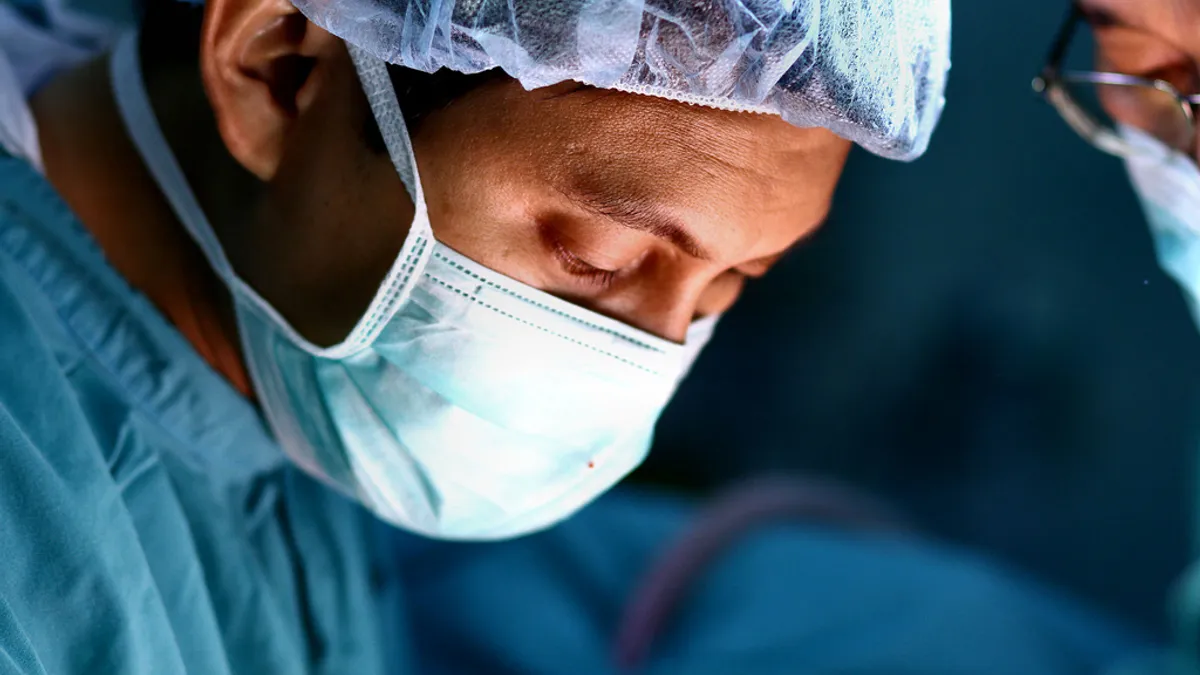Dive Brief:
- Stryker said its neurotechnology business led Q2 revenue growth as earnings exceeded the company’s own projections for the quarter. The medical device maker, which recently shot down rumors it was interested in buying Boston Scientific, told analysts on its Q2 conference call that it is sticking with its “proven offense” of targeting small companies for acquisitions.
- Company executives gave a bullish update on adoption of the Mako robot for knee surgery, saying there are now more than 550 robots installed worldwide. “With high demand, we are confident regarding the outlook for continued strong robot sales,” CEO Kevin Lobo said.
- Kalamazoo, Mich.-based Stryker, which recently appointed company veteran Timothy Scannell to the post of president and COO among other leadership changes, announced more promotions on its call: Dylan Crotty was named president of the instruments business and Brent Ladd was named president of the endoscopy business.
Dive Insight:
Stryker last month disputed rumors that it had held merger talks with Boston Scientific, as reported by the Wall Street Journal. Asked on the earnings call whether the recent series of management changes signaled a shift in capital allocation plans, Stryker executives denied any connection between the promotions and its M&A strategy.
“Our capital allocation philosophy has not changed and has been consistent for the entire time I’ve been the CEO,” Lobo said. The planned retirement of David Floyd as head of orthopaedics and Lonny Carpenter as head of global quality and business operations created an opportunity to revisit the operational structure and reward high-performing leaders, the CEO said.
In addition to the promotions of Scannell, Crotty and Ladd, Stryker recently named Viju Menon, formerly chief supply chain officer at Verizon, to replace Carpenter. Earlier this month, J. Andrew Pierce was appointed group president of MedSurg, and Spencer Stiles was named group president of instruments, neurotechnology and spine.
The new structure is intended to drive performance as Stryker becomes a “progressively larger company,” Lobo said. “I really wouldn’t read anything more into that. At this stage in our development as a company and in my tenure as CEO, this is a nice logical move really triggered by the retirements.”
Katherine Owen, vice president of strategy, said there’s been no change in how management thinks about acquisitions, noting that historically the vast majority of Stryker’s deals have involved small and mid-sized companies. “That’s a proven offense that’s helped accelerate our organic sales growth, and that’s the offense we’re going to continue with,” she said.
Stryker reported net sales increased 10.3% to $3.3 billion, with organic sales up 7.9% despite a less-favorable foreign currently outlook. Unit volume increased 9.0%, partially offset by a 1.1% decline in prices. Lobos said the company has expanded its sales and marketing teams, which has kept company sales growth at the high end for the medtech industry.
Adjusted earnings per share rose 15% to $1.76, exceeding the high end of the company’s guidance range of $1.70 to $1.75 per share.
Sales growth was broad-based across divisions. Orthopaedics sales rose 7.6%, MedSurg increased 8.9%, and neurotechnology and spine were up a combined 19.4%.
Owen said the core spine business, which saw organic growth of more than 5%, remains “challenged.”
In the second quarter, the company installed 39 Mako robots globally, with 29 in United States, up from 26 globally a year ago, of which 20 were U.S. installations. More than 18,000 total knee replacement procedures have been performed with the Mako robot year to date.
Stryker in the quarter gained FDA approval for a flow diverter device to treat large intracranial aneurysms that have not ruptured The device enables physicians to divert blood flow away from the aneurysm to prevent rupturing. Stryker will now compete for the market with Medtronic, which gained a flow diverter device through its $49.9 billion takeover of Covidien.
Stryker boosted its full-year forecasts for organic sales growth of 7% to 7.5% and adjusted earnings in a range of $7.22 to $7.27 per share. It previously forecast organic sales growth of 6.5% to 7% and adjusted earnings of $7.18 to $7.25 per share.











